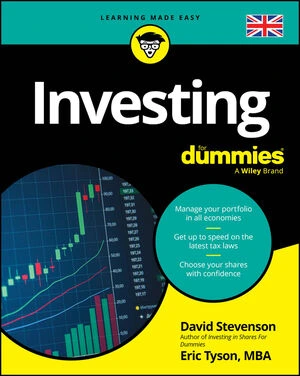How to know if you’re a passive investor
Passive investors don’t try to beat the stock market. They merely try to keep up with it by owning all the stocks in an index. An index is a basket of stocks that mirrors the market. Passive investors are happy matching the market’s performance.You know you’re a passive investor if you like the following ideas:
- Not picking individual stocks: These investors buy large baskets of stocks that mirror the performance of popular stock indexes like the Dow Jones Industrial Average or the Standard & Poor’s 500 index so they don’t worry about whether a small upstart company they invested in will release its new product on time and whether it will be well received.
- Owning mutual and exchange-traded funds: Because passive investors aren’t looking for the next Microsoft, Google, or Apple, they buy mutual and exchange-traded funds that buy hundreds of stocks. (We cover mutual and exchange-traded funds in more detail in Book 5.)
- Reducing taxes: Passive investors tend to buy investments and forget about them until many years later when they need the money. This can be lucrative because by holding onto diversified investments for a long time and not selling them, passive investors can postpone when they have to pay capital gains taxes.
- Not stressing about stocks’ daily, monthly, or even annual movements: Passive investors tend to buy index or mutual funds and forget about them. They don’t need to sit in front of financial TV shows, surf countless financial websites, read magazines, or worry about where stocks are moving. They’re invested for the long term, and everything else is just noise to them.
Sites for passive investors to start with
One of the toughest things about being a passive investor is sitting still during a bull market when everyone else seems to be making more than you. Yes, you might be able to turn off the TV, but inevitably you’ll bump into someone who brags about his or her giant gains and laughs at you for being satisfied with 10 percent market returns.When that happens, it’s even more important to stick with your philosophy. Following the crowd at this moment undermines the value of your strategy. That’s why even passive investors are well served going to websites where other passive investors congregate:
- Bogleheads is an electronic water cooler for fans of Vanguard index funds and passive investors to meet, encourage, and advise each other. They call themselves Bogleheads in honor of the founder of Vanguard, John Bogle.
- The Arithmetic of Active Management is a reprint of an article by an early proponent of passive investing, William Sharpe, who explains why active investing can never win.
- Vanguard’s website contains many helpful stories about the power of index investing and offers them for free, even if you don’t have an account.
How to know whether you’re an active investor
Active investors almost feel sorry for passive investors. Why would anyone be satisfied just matching the stock market and not even try to do better? Active investors feel that if you’re smart enough and willing to spend time doing homework, you can exceed 10 percent annual returns. Active investors also find investing to be thrilling, almost like a hobby. Some active investors try to find undervalued stocks and hold them until they’re discovered by other investors.You’re an active investor if you
- Think long-term averages of stocks are meaningless: Active investors believe they can spot winning companies that no one knows about yet, buy their shares at just the right time, and sell them for a profit.
- Are willing to spend large amounts of time searching for stocks: These are the investors who sit in front of financial TV shows, analyze stocks that look undervalued, and do all sorts of prospecting trying to find gems.
- Believe you can hire mutual fund managers who can beat the market: Some active investors think that certain talented mutual fund managers are out there and that if they just give their money to those managers, they’ll win.
- Suspect certain types of stocks aren’t priced correctly and that many investors make bad decisions: Active investors believe they can outsmart the masses and routinely capitalize on the mistakes of the great unwashed.
- Understand the risks: Most active traders underperform index funds, some without even realizing it. Before deciding to be an active trader, be sure to test out your skills with online simulations, or make sure that you’re measuring your performance correctly. If you’re losing money picking stocks, stop doing it. Be sure to know how dangerous online investing can be when you’re trying to be an active investor by reading a warning from the Securities and Exchange Commission.
Sites for the active investor to start with
Ever hear of someone trying to learn a foreign language by moving to the country and picking it up through “immersion”? The idea is that by just being around the language, and through the necessity of buying food or finding the restroom, the person eventually becomes proficient.If you’re interested in active investing, you can do the same thing by hitting websites that are common hangouts for active investors. By lurking on these sites, you can pick up how these types of investors find stocks that interest them and trade on them. These sites can show you the great pains active investors go through in their attempt to beat the market. A few to start looking at include the following:
- TheStreet.com collects trading ideas and tips from writers mainly looking for quick-moving stocks and other investments.
- TradingMarkets explores the details of complicated trading philosophies. The site highlights stocks that have moved up or down by a large amount, which is usually something that catches the attention of traders.
- Seeking Alpha provides news and commentary designed for investors of all skill levels who are trying to beat the market.






